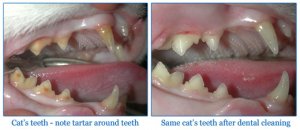 DENTAL CARE IS PREVENTIVE CARE
DENTAL CARE IS PREVENTIVE CARE
Dental care is an important component of your pet's healthcare program. Together, as partners in your pet's health, we must contribute to your pet's wellbeing. You may be familiar with the concept of pet wellness. This approach to preventive care for your pet supports the vitality and long life of our little family members.
Neglect of dental care can result in plaque accumulation and unhealthy populations of bacteria in your pet's mouth. This can lead to:
- Bad breath
- Tartar
- Red gums
- Sore, painful gums and teeth
- Excessive salivation
- Abnormal eating habits
- Lack of energy
- Damage to internal organs
Even if obvious signs are not present, your pet's health can be affected by unhealthy teeth and gums.
If dental disease is left untreated, bacteria can enter your pet's bloodstream and reach your pet's vital organs. A bacterial infection can then cause damage to internal organs like the heart, kidney and liver.
There are two critical components of your pet's veterinary dental care: oral examinations and dental cleanings.
The Oral Examination
Your vet examined your pet's mouth for signs of dental disease. An exam includes looking for developmental anomalies such as misaligned or retained teeth. It also involved looking for the accumulation of plaque and tartar, periodontal disease and oral tumors.
 The Routine Dental Cleaning
The Routine Dental Cleaning
Dental cleanings can be performed as stand-alone procedures or may be combined with tooth extractions or surgical treatment of disease found in the mouth.
Pre-Anesthetic Blood Screen
We make sure your pet is healthy before administering anesthetic. Although complications resulting from modern anesthetic are rare, we need to be sure your pet is in good health and we may recommend a blood screen as part of an anesthetic safety evaluation. This blood screen can identify concerns with organ function and blood values and also sets a baseline for your pet's health to be included in his or her health record. If your pet becomes sick in the future as a result of illness or pre-existing conditions, a record of previous test results can provide valuable information about changes in organ function.
Scaling and Polishing
We remove plaque and calculus (tartar) from your pet's teeth just as dentists perform this work on your teeth. Since much of the tartar is below the gumline, this procedure can not be done properly with just a toothbrush. Once all the plaque and calculus is removed we polish your pet's teeth with a special paste to smooth-out any scratches in the tooth enamel.
Extractions
Dependant upon the grade and severity of your pet's dental health status, 1 or more teeth may require extraction. Extraction of infected, broken, or damaged teeth will help restore your pet's oral health and eliminate or decrease pain associated with infected area.
Procedure Precautions
During the dental procedure we carefully monitor your pet's vital signs including respiration and heart rate. Intravenous (IV) fluids are administered as required. Antibiotics and analgesics (pain medications) will also be administered as needed.
After the Cleaning
Once the cleaning has been performed, it is your turn to continue caring for your pet's dental health. Talk to us about brushing your pet's teeth to reduce the need for future cleanings. We are also happy to talk to you about other options for maintaining dental health, like special foods, treats, mouth rinses and sprays.
What can you do?
You are responsible for regular brushing and use of dental care products. We stock a variety of pet dental care products. It is important to use pet products and not products developed for human use. Maintain regular visits to your veterinarian for dental exams and get in a egular cycle of dental cleanings.
It's important that you call us today to discuss when we should book a dental exam for your pet.

 DENTAL CARE IS PREVENTIVE CARE
DENTAL CARE IS PREVENTIVE CARE The Routine Dental Cleaning
The Routine Dental Cleaning